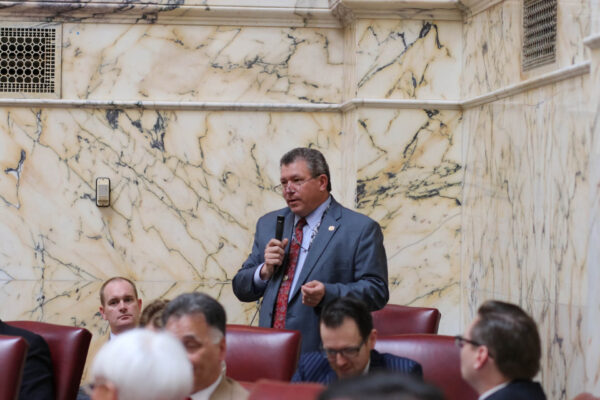This article was republished with permission from WTOP’s news partners at Maryland Matters. Sign up for Maryland Matters’ free email subscription today.

This content was republished with permission from WTOP’s news partners at Maryland Matters. Sign up for Maryland Matters’ free email subscription today.
Lawmakers are preparing emergency legislation in the final days of the General Assembly session that would give them more oversight of the state’s only veterans nursing facility.
Members of the House and Senate Veterans Caucus met Thursday morning with Gov. Wes Moore (D) and Maryland Veterans Affairs Secretary Anthony Woods. The meeting, which was not open to Maryland Matters, included a briefing on abuse and neglect incidents at Charlotte Hall Veterans Home in St. Mary’s County, caucus members said.

Following the meeting, lawmakers expressed concern about the facility. Some said they would press for more oversight.
“The biggest thing is we have to ensure that we can move forward with reporting requirements,” said Sen. Jack Bailey (R-Calvert and St. Mary’s). “We didn’t know that this happened.”
Lawmakers’ efforts include emergency legislation in the last three weeks of the session. If passed, that bill would provide more assurance of oversight than budget language being considered.
The bill, sponsored by Bailey in the Senate and Economic Matters Vice Chair Brian M. Crosby (D-St. Mary’s) in the House, requires operators of state-owned nursing facilities to provide near-immediate notice to a cadre of state officials and agencies for of a laundry-list of violations.
“The bottom line is how do you even get in front of the problem if you don’t know it exists?” Crosby said. “The bill is designed to do it for us.”
Included in that notice list are any citations issued or enforcement actions taken by state or federal regulators. Notices would be sent to the Senate Finance and House Health and Government Operations Committee, the governor, the state agency responsible for the facility and lawmakers who represent the district where the nursing home is located.
Within 30 days, operators of state-owned nursing homes would be required to provide a statement of deficiencies, a plan for correcting them and all letters from regulators.
The proposal would also require the Department of Health to provide an annual report on all state and federal regulator reviews and enforcement actions on a state-owned nursing home.
Bailey called the bill “overarching.” He said he expected it would have broad support in the Senate. Crosby said he believes it will pass in the final weeks of the session.
Other lawmakers are equally optimistic.
“I think that the urgency gives a good chance,” said Sen. Michael A. Jackson (D-Prince George’s, Charles and Calvert), who is Senate co-chair of the Veterans Caucus. “There’s a very good chance. It’s coming reasonably late, quite frankly, because as things are being uncovered we’re realizing beyond the budget language we’re putting in that there’s more to needed to be done.”

The Senate this week adopted budget language that would require the Maryland Department of Veterans Affairs to issue quarterly reports on Charlotte Hall. The reports would be required to include a census of residents, complaints, any reports of abuse or neglect as well as updates on ratings or fines by federal agencies.
The budget language is not legally binding. Departments, however, take it seriously because budget committees can withhold money in the future.
The final budget language will likely be decided by a conference committee of budget negotiators from the House and the Senate. The panel is expected to meet in the coming weeks to iron out differences between the versions of the budget passed by each chamber.
Roughly two dozen or so caucus members dined on eggs and bacon and turkey sausage, a lawmaker said. They were briefed on incidents that caused the state to end a 20-year relationship with a South Carolina company hired to operate the Charlotte Hall Veterans Home.
Before entering the meeting at the governor’s official residence, Sen. Katherine Klausmeier (D-Baltimore County) said she first learned of concerns at the facility from news reports.
“I was appalled to hear about the conditions there,” Klausmeier said. “Especially since [former] Secretary [George] Owings used to put Charlotte Hall on a pedestal.”
Charlotte Hall Veterans Home opened in 1985 and provides assisted and skilled nursing care for honorably discharged veterans and their spouses. Residents typically have more challenging physical and mental health care needs than residents of private facilities.
South Carolina-based HMR has run the home for the state since 2002. The company is in the seventh year of an eight-year contract. That deal, awarded in 2016, was worth a total of $341.7 million.
In January, the Centers for Medicare and Medicaid Services issued a series of reports highlighting concerns at the facility. The federal agency gave Charlotte Hall its lowest rating accompanied with a warning about reports of abuse.
The findings include minor to more serious issues involving physical abuse or degradation.
Since 2020, the federal agency has fined the facility four times, for a total of $266,217. Fines are assessed for an array of issues including serious health or safety issues. Fines can also be issued for failing to correct a citation for an extended period.
The lowest fine assessed against HMR was $650 in December 2020. The operator was fined more than $164,000 in April 2021 and more than $100,000 in August 2022, according to federal records.
Crosby called the situation “inherently criminal.”
“Veterans who are in their golden years want to retire with dignity, be treated with dignity and all the things that they fought for,” he said. “There was abuse and neglect in a nursing home run by this (contractor) the state designed for them. It’s not acceptable for anybody. Certainly not that community.”
Moore has announced that the state intends to end its contract with HMR. The plan is to rebid the contract and have a new operator in place by June.
Jackson said legislative concern would follow the issue even after the legislative session ends next month.
“I think we’re looking for ways to have more accountability and more oversight from us,” said Jackson. We’re trying to do our part to make sure that we do have oversight as best we can.”
“This isn’t over on April 10,” he said.







